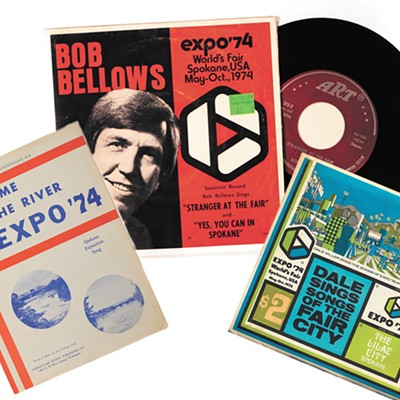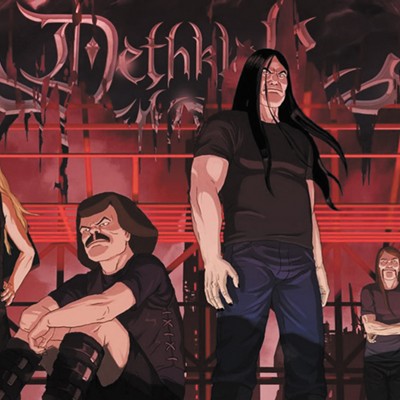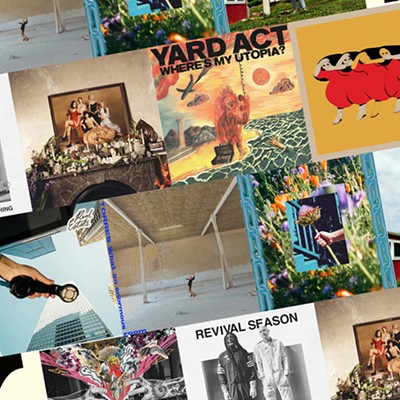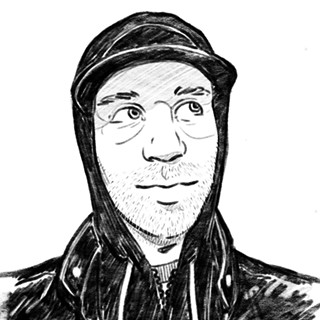Bad Religion bassist Jay Bentley chats about the enduring legacy of the legendary punk band
[
{
"name": "Broadstreet - Instory",
"component": "25846487",
"insertPoint": "4",
"requiredCountToDisplay": "4"
},{
"name": "Broadstreet - Empower Local",
"component": "27852456",
"insertPoint": "8",
"requiredCountToDisplay": "8"
},{
"name": "Broadstreet - Instory",
"component": "25846487",
"insertPoint": "12",
"requiredCountToDisplay": "12"
},{
"name": "Broadstreet - Instory - 728x90 / 970x250",
"component": "27852677",
"insertPoint": "18",
"requiredCountToDisplay": "18"
},{
"name": "Broadstreet - Instory",
"component": "25846487",
"insertPoint": "5th",
"startingPoint": "23",
"requiredCountToDisplay": "24",
"maxInsertions": 100
}
]
Punk rock may be considered a young person’s game, but don’t tell that to Bad Religion. The legendary Los Angeles punk band has been active since 1980, with the group’s debut LP How Could Hell Be Any Worse? coming out 40 years ago. But steered by original core members Greg Graffin (vocals), Jay Bentley (bass) and Brett Gurewitz (guitar), the group has never allowed itself to drift into the territory of being a legacy or nostalgia act.
The band’s no-frills, unapologetic, straightforward and driving style also has always carried a sense of composure, allowing the music across 17 studio albums to age incredibly well. Unlike a lot of standout punk bands, consistency has always been at the forefront. There’s no singular landmark Bad Religion album, which rewards listeners who dive deep into the group’s catalog. Heck, you can make an argument that the eight most popular Bad Religion songs come from eight different albums. Can any other bands make that claim?
In anticipation of the band’s first ever headlining show in Spokane, we caught up with Bentley to discuss the state of punk and the band’s illustrious career.
INLANDER: What’s the relationship dynamic between you and singer Greg Graffin and guitarist Brett Gurewitz having been in the same band together for four decades now?
BENTLY: Brett doesn’t tour with us, so getting together with Brett is always sort of like seeing the relative that you only see a couple times a year. It’s always fun, and then we just go about our day.
And Greg and I are kind of like past all of it. I don’t know how to describe it other than maybe you don’t want to be in the same room with the person, but you’d step in front of a bullet for them. I don’t really know how that all works. It’s sort of a perfect relationship that has defined how Bad Religion has been since the beginning. We were always very independent, even as individuals.
What keeps being part of this band exciting for you?
Just playing, honestly. Some people have asked, “Do you ever get tired of playing certain songs every night?” And the answer is no, I really don’t. I understand what they’re saying. And I understand why they’re saying it. But I don’t have that feeling. When you’re sitting here talking, you could say, “Man, I’m so tired of playing that song.” But when you’re out on stage and it’s all happening, you can’t wait to play that song. I’ve played with other bands, but there’s something magic that happens here [in Bad Religion] when the drums click in. I can’t really explain it other than I want to do this all the time.
With such a sprawling catalog, how do you determine setlists each night when touring?
Sometimes it’s a bit overwhelming because you really want to present surprises. I’m still a fan of music, and I like to go see concerts, and I always get a kick out of seeing something that’s not usual. But at the same time, there are songs that I just know I’m going to put in the setlist before I even get out of pen. And the reason that I do that is because Greg will say from stage, “How many people is this your first time seeing Bad Religion?” and so many people raise their hands. And I’ll say, “That’s why we play ‘21st Century (Digital Boy)’ every night. That’s why we play ‘You’ a lot.” Because those are songs from videos or from a certain era or from the only gold record we’ve ever had. I try to make sure to touch on those points for people that may have heard of us from just one song. I want to find those songs. But at the same time, for people that’ve seen us many times, I want to play something where they go, “Wow, I never thought I’d see that live.”
It’s funny, when you’re writing a setlist, you already know that you’re going to disappoint people. [Laughs] You just accept that. You try to find a compromise. One time we were having a band issue, and we were saying that we would come to a compromise. And Greg looked at me and says, “Do you know what the meaning of compromise is?” And I kind of went, “I think I do?” And he said, “It means no one is happy.” [Laughs] That’s awesome. Right there is the best thing I’ve ever heard. So a lot of times we compromise with the setlist, and no one’s happy and we move on.
What’s it like being on stage and seeing literal generations of fans in the crowd? Like you could legitimately see a longtime Bad Religion fan bring their grandkid to their first punk show.
I do understand that privilege, because it feels like the people that started following us in the late ’80s, like with [the album] Suffer or whatever … I see those people, and I realize what a privilege it is to have grown up with them. They didn’t just come in for one record and then leave. And so many people have sort of stayed with us, and you’re right, they bring their kids.
And then there is another group of people, much like the Warped Tour, it’s sort of a skateboard, alternative-lifestyle culture. We get those people as well.
What do you think are some of the differences in starting a punk band in 1980 versus starting one now?
I think [its’s] the same, honestly. The advantage that any band has now is Bandcamp, and being able to have your music go online and basically go global in a heartbeat. But saying that, you still have to find a fanbase, you have to start somewhere.
The thing that has changed in my mind is the punk that I kind of grew up with in LA was Black Flag and Circle Jerks and Germs and Fear. And growing up now, people have references to Blink-182 and Green Day and bands that really didn’t exist in that time. Like, the only [bands] kind of like that were maybe Circle Jerks and the Buzzcocks, they were the two bands that were sort of lighthearted and poppy. And you knew right away, “Well, are you going to be Black Flag or are you going to be the Buzzcocks?” There was nowhere in the middle. But to the benefit of bands coming out now, you have a much broader palette to choose from in terms of your musical preference. It’s not so narrow-minded.
Since so much of punk music is rooted in youthful rage, how has your perspective changed as you’ve become a veteran punk musician?
The hope is that you sort of grow into your rage. You don’t grow out of it, you’re able to focus it a lot better. I think when you’re young, you’re sort of a Tasmanian devil of emotions. And you get to a point in your life where you can finely tune your anger and your rage at what you’re upset about, versus just everybody. Hopefully, we’ve become a little more eloquent in our ability to relay our feelings. You don’t talk about emotions in punk rock songs. You’re not supposed to anyway. [Laughs] It’s just sort of cut and dry: Here it is, and shut up.
Yeah, the only emotion is “f—- you!”
[Laughs] Pretty much.
It’s funny because we’ve been tagged as a political band a few times. And I say, “Look, we’re social-political. We don’t really talk about politics, we talk about what it’s like to be a person.” What does it feel like to be a person on the planet in 2022? And the songs that we wrote for Suffer in 1988 are still relevant today in the sense of, how does it feel to have responsibilities to wake up in the morning and worry about your family or your job? Or any number of things that come to light? Because you are a human that has to live on this planet with those emotions.
It is something that we talked about when we were younger. We didn’t have any long-term goal, but we did say that we wanted to write songs that were more important than, you know, “f—- the cops” or “I’m not going to school today!” “I’m anti- and I’m gonna dig my heels in and I’m not gonna do what you tell me to do!” It’s like, OK, that’s cool, but you didn’t ever have to say it in the first place like that. Sometimes you’re just like, “What are you angry about? Why are you yelling at me?”
One time we were driving by and this band was playing, and (Lagwagon’s) Joey Cape said to me, “I don’t know what the guy’s yelling about, but it can’t be important.” That’s what it feels like. Stop yelling at me. Why are you yelling at me? I’m fine. I’m right here. You do realize that eventually you’ll grow out of that. If the name of your band is Punk Youth and all you’re doing is screaming about how upset you are because you’re 16, that’s not going to age very well. By the time you’re 30, you’re like, “Yeah, we couldn’t really play those songs anymore.” Right?
Anything you’re excited about in regards to this upcoming tour?
This is the first time we’ve ever been to Spokane on our own, which is exciting.
I love this opening band that’s coming to play with us, Slaughterhouse. They came and played with us at the Palladium. I don’t want them to know that I said this, but they reminded me of the bands from ’81 who were just doing something that they wanted to do without really any reference. And they don’t know that they’re doing that. I was watching them going, “You’re exactly what we grew up with.” Because every band sort of had a different take on what they thought punk rock was, and this band is doing exactly that. I was fascinated by them. And we all kind of said we have to bring this band out for people to see. You have to see this to understand what we grew up with. ♦
Bad Religion, Slaughterhouse • Wed, March 30 at 8 pm • $35-$38 • All ages • Knitting Factory • 919 W. Sprague Ave. • sp.knittingfactory.com • 509-244-3279



















